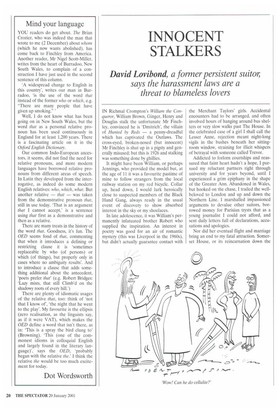Mind your language
YOU readers do get about. The Brian Crozier, who was indeed the man that wrote to me (2 December) about whom (which he now wants abolished), has come back to Finchley from America. Another reader, Mr Nigel Scott-Miller, writes from the heart of Burradoo, New South Wales, to complain of a construction I have just used in the second sentence of this column.
'A widespread change to English in this country', writes our man in Burradoo, is the use of the word that instead of the former who or which, e.g. "There are many people that have given up smoking."' Well, I do not know what has been going on in New South Wales, but the word that as a personal relative pronoun has been used continuously in England for at least 1,200 years. There is a fascinating article on it in the Oxford English Dictionary.
Our common Indo-European ancestors, it seems, did not find the need for relative pronouns, and more modern languages have borrowed relative pronouns from different areas of speech. In Latin they developed from the interrogative, as indeed do some modern English relatives: who, which, what. But another relative — that — was taken from the demonstrative pronoun that, still in use today. That is an argument that I cannot accept,' is a sentence using that first as a demonstrative and then as a relative.
There are many treats in the history of the word that. Goodness, it's fun. The OED seems fond of that, commenting that when it introduces a defining or restricting clause it is 'sometimes replaceable by who (of persons) or which (of things), but properly only in cases where no ambiguity results'. And to introduce a clause that adds something additional about the antecedent, 'poets prefer that' (e.g. Robert Bridges: 'Lazy mists, that still Climb'd on the shadowy roots of every hill.') There are plenty of idiomatic usages of the relative that, too: think of 'not that I know of, 'the night that he went to the play'. My favourite is the ellipsis (zero realisation, as the linguists say, as if it were VAT), which makes the OED define a word that isn't there, as in: 'This is a spray the bird clung to' (Browning). 'This (one of the commonest idioms in colloquial English and largely found in the literary language)', says the OED, 'probably began with the relative the.' I think the relative the would be too much excitement for today.
Dot Wordsworth






























































 Previous page
Previous page